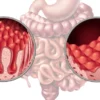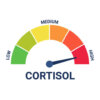
Introduction
Irritable bowel syndrome (IBS) and endometriosis are two conditions that affect women of reproductive age. Both are considered to be common, and with the overlap in certain symptoms, this means there can be a lot of confusion around where one condition ends, and the other begins.
It has been found that having endometriosis increases the risk of developing IBS by 3-fold. This indicates a strong link between the 2 conditions. However, with the symptoms being similar, are there links between the underlying causes of IBS and endometriosis?
In this article, we’ll look at what each condition is and how they differ from one another. This can help to provide clarity on how to address these issues. [Source: PubMed]
What is IBS?
IBS is a common condition that affects the digestive system. It describes a range of gut-related symptoms, including abdominal pain and discomfort, bloating, and bowel changes such as diarrhoea or constipation. These symptoms can significantly impact the patient’s quality of life.
While a single cause of IBS symptoms is not known, there are several risk factors for developing IBS.
The risk factors for IBS include:
- Dietary patterns
- Food poisoning
- Food intolerances
- Stress
- Trauma
- Gastroenteritis [Source: PubMed]
Treatment options include probiotics, herbal medicines, lifestyle changes such as reducing stress levels, dietary changes, medication, and complementary therapies such as gut-directed hypnotherapy. [Source: PubMed]
What is Endometriosis?
Endometriosis is a condition where the tissue that lines the uterus grows in a different area. This can be to other organs in the pelvis, such as the bladder and bowels.
It can lead to a wide range of symptoms, such as cause pain, infertility, and digestive symptoms. [Source: NHS]
Treatments for this condition include:
- surgery to remove the overgrowth of tissue
- hysterectomy
- painkilling medication
- hormonal contraception [Source: PubMed]
How are IBS and endometriosis similar?
Both IBS and endometriosis are chronic conditions that can cause pain and discomfort. For many, there is a significant delay in how long these conditions take to be diagnosed. With IBS, it can be following 3 months of the symptoms being present. With endometriosis, it can be significantly longer as, on average, it takes 8 years from the onset of symptoms to receive a diagnosis. [Source: Endometriosis UK]
A similarity between the 2 conditions is the influence of chronic (ongoing) inflammation. This can be a factor that contributes to the symptoms of pelvic pain. Other factors that link these 2 conditions include:
- mast cell activation
- neuronal inflammation
- leaky gut
- gut dysbiosis
In addition, both conditions may require medications or other treatments to manage symptoms, as well as lifestyle changes like diet modifications or exercise regimens. [Source: PubMed]
How are IBS and Endometriosis Different?
The two conditions are very different. IBS is a functional disease, meaning it is not caused by an underlying issue that can be found on many tests. Endometriosis is a disease that affects the uterus and ovaries and can cause severe pain as well as infertility if left untreated. This means that the cause of endometriosis symptoms can be found via scans and tests.
While IBS does not increase the risk of developing health complications, it does have a significant impact on the individual’s quality of life.
It is, however, possible for there to be complications of endometriosis that may require antibiotics. [Source: PubMed]
What Causes these Conditions?
The causes of both IBS and endometriosis are not well understood. Both conditions are thought to be related to inflammation and stress, but the exact cause is unknown.
IBS is more common than endometriosis, affecting about 10% of people in their lifetime. [Source: PubMed]
IBS can start at any age but usually develops before age 35. Women who have had IBS symptoms for less than 6 months may be diagnosed with “sub-clinical” irritable bowel syndrome (IBS). [Source: PubMed]
As with IBS, the exact cause of endometriosis is not fully known. However, these are well-understood risk factors that include:
- Shorter than 27-day menstrual cycles.
- A low body mass index (BMI)
- Low number of births
- Caucasian race
- Age. The condition impacts those within the range of 25–29 years of age.
- Daily consumption of alcohol in the amount of at least 10 g per day. [Source: PubMed]
Are there any symptoms to look out for?
The most common symptoms of IBS are abdominal pain and cramping, bloating, constipation, and/or diarrhoea. The severity of these symptoms can vary from person to person. Some people may experience mild discomfort, while others are unable to work or go about their daily lives due to the disabling nature of their gut symptoms.
With IBS, there are certain red flag symptoms to consider that may require medical attention. These red flag symptoms include:
- Weight loss
- Blood in stools
- Anaemia
- Fever [Source: BMJ]
The following is a list of possible symptoms associated with endometriosis:
- Painful periods (dysmenorrhea)
- Chronic pelvic pain that does not improve with time
- Excessive bleeding between periods (menorrhagia) or after intercourse
- Heavy menstrual flow [Source: PubMed]
Can You Get Both IBS and Endometriosis at the Same Time?
It’s possible to have both conditions at the same time. It’s also possible to have one of these conditions without the other. If you have one of these conditions and don’t know which one it is.
With this in mind, working to evaluate health history, and symptoms, alongside appropriate testing options, can help to create a personalised plan to address the appropriate areas.
The challenge can often be understanding which condition is causing the symptoms. For example, if the abdominal discomfort stems from the bowel or the pelvic or uterine region. This is an important consideration when working with a registered health professional. [Source: PubMed]
Testing Options for IBS
Before a diagnosis of IBS is given, it’s common for a series of initial tests to be carried out. These can be helpful to assess certain factors that can lead to the symptoms of IBS.
These initial tests are often carried out by a GP and include:
- Coeliac blood test
- Calprotectin stool test (to test for inflammation)
- Stool tests to test for infections [Source: PubMed]
In other circumstances, further testing may be carried out via a referral to a gastroenterologist.
These tests can include:
- Endoscopy
- Colonoscopy
- CT scan
- Ultrasound scan [Source: PubMed]
The ROME IV criteria for IBS state that for a diagnosis of IBS to be given, symptoms are to be present but in the absence of a diagnosed gut condition. For example, if Crohn’s disease was found to be the cause, it would not be possible for the diagnosis of IBS to be given at the same time.
However, if no other causes of the symptoms are found, the diagnosis of IBS will likely be given. This means that IBS is often described as a condition of exclusion. This means that the tests have not actually identified the cause, only ruled out other explanations of the gut symptoms. [Source: PubMed]
With the other possible causes of IBS symptoms, this is where a referral to a nutritional therapist can be helpful to assess for causes such as food intolerances or SIBO. [Source: PubMed]
Additionally, due to the crossover in IBS symptoms and the symptoms of endometriosis, a referral to a gynaecologist may also be suggested. This may involve further testing, such as further ultrasound testing as well as MRI scans. [Source: PubMed]
Treating IBS and Endometriosis
There are many ways both of these conditions can be supported to work to address the underlying imbalances. The approaches for both conditions can involve:
- Specific supplements such as probiotics or anti-inflammatory [Source: PubMed, PubMed]
- Therapeutic diets [Source: PubMed, PubMed]
- Further testing considerations (such as a SIBO breath test) [Source: PubMed]
While IBS and endometriosis have not been indicated to impact lifespan, they can both impact quality of life. This means it may be difficult for friends or family members who don’t have any experience with these conditions to understand why they’re affecting your life so much. [Source: PubMed, PubMed]
Conclusion
IBS and endometriosis are both common conditions that can affect women. If you have one of these conditions (or are unsure which condition you have), assessments and testing can help to clarify.
In some cases, the symptoms caused by one condition may overlap with those of another, and this is why it’s so important that you know what they are so that you can get proper care for them.
A better understanding of the underlying condition and possible causes allows an appropriate treatment to be created.






